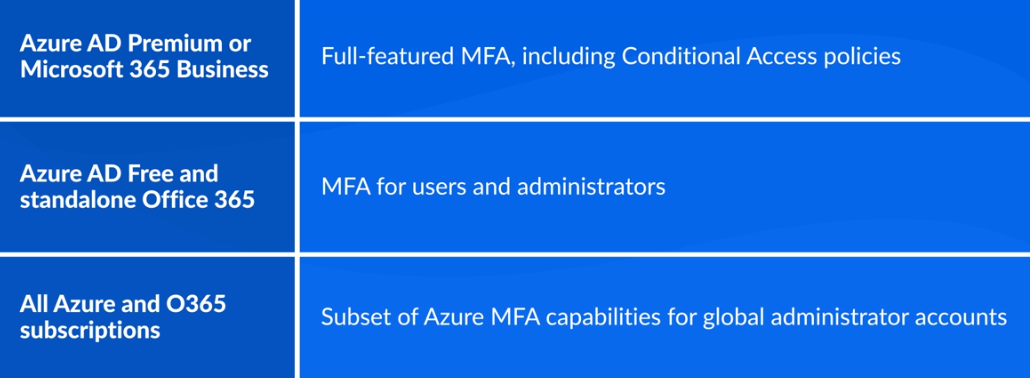Azure MFA
Azure Multi-Factor Authentication (MFA)
Azure Multi-Factor Authentication (MFA) adds an extra layer of security by requiring multiple methods of authentication. This ensures that even if one method is compromised, unauthorized access is still prevented.
MFA combines:
- Something the user knows (password)
- Something they possess (e.g., smartphone)
- Something they are (biometrics)
Usage:
- Protects data and applications without compromising user experience
- Included in Azure AD Premium, Microsoft 365 Business, Azure AD Free, and standalone Office 365 licenses
- Premium versions offer additional features like Conditional Access policies

MFA Supported Methods
What you have:
- Access codes via SMS
- Access codes via voice call
- Microsoft Authenticator app
- Hardware keys
- OATH software tokens
What you are:
- Windows Hello for Business
- Fingerprint recognition
Passwordless Methods
Simplifies authentication by eliminating the need for a password:
- Windows Hello
- Microsoft Authenticator
- FIDO2 security keys
Licensing
Free Version
- Supports MFA through the Microsoft Authenticator app
Azure AD Premium
- Offers additional authentication methods and Conditional Access features
- Conditional Access:
- Gathers identity signals (e.g., device used).
- Makes decisions based on configured rules.
- Finally, it enforces decisions, such as blocking access.
Conditional Access
Conditional Access defines conditions for user access based on various factors, which enhances security and ensures compliance with organizational policies.
- Supports various authentication methods
- Requires specific conditions for login (e.g., device type, location)
- Enforces security standards on managed devices
- Utilizes mobile device management tools like Microsoft Intune
Testing and Validation
Use the What If Tool to test conditional access policies before implementation, ensuring that new policies do not inadvertently disrupt user access.
Test the conditional access policy:
az ad conditionalaccess policy whatif --policy-id <PolicyID> --user-id <UserID>
Output:
{
"policyId": "<PolicyID>",
"userId": "<UserID>",
"conditionsMet": true,
"accessDecision": "grant",
"message": "The user is compliant with the Conditional Access policy and access is granted."
}
Licensing Management
Manage Azure AD licenses efficiently to ensure users have the necessary access:
- Assign a Premium license to each user account.
- Azure AD licensing is per account.
- Simplify by assigning a license to a group.
- Other licenses, such as Microsoft 365, can also be assigned to users and groups.
Dynamic Membership Rules
Maintain up-to-date group memberships with automated rules:
- Automatically updates group memberships.
- Adds or removes users based on predefined rules.
- Example: Use the "All users" rule to apply Conditional Access policies universally.